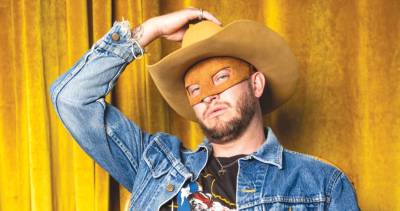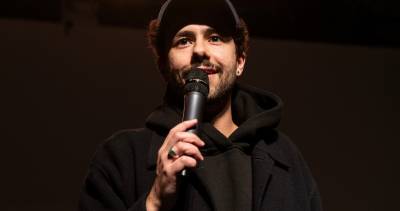Ricky Gervais plays putz in Ghost Town
Ricky Gervais has picked up 11 Emmy nominations (including four in 2008), created two popular TV characters, and is executive producer of one of the most acclaimed sitcoms in recent American history. His performance on Extras, and as star and cocreator of the British version of The Office, hasn’t made him famous in America, but it has gained him enough respect as a comedian that he was given the lead role in a major American film.
In Ghost Town, which opens tomorrow, he plays a dentist who sees dead people. In Vancouver to costar in A Night at the Museum 2: Battle of the Smithsonian, prior to taking Ghost Town to the Toronto International Film Festival, he said that he was offered a lot of scripts after The Office first aired in Britain.
“I was flattered by all the offers,” he said in a room at a downtown hotel, “but too many people make a film that is on the side of a bus for a week before it goes to DVD. Then they do 30 of those and no one ever says, ”˜He did 30 bad films; let’s give him one good one.’ The first script that I got was for a film where they wanted me to play a 29-year-old, and I said, ”˜Right, I think you need someone else.’”¦I liked this one immediately and it felt like I had written it.”
In Ghost Town, Gervais plays dentist Bertram Pincus, who takes an anesthetic for a small operation and ends up dying for seven minutes before being revived. When walks out into the streets of New York City, he is approached by several people who seem normal to him. They’re actually ghosts, unaware of why they are still on Earth and hoping that he can provide them with an answer. Bertram discovers that although he has never really liked dealing with living people, he likes being able to see the dead less.
There was no doubt in Gervais’s mind that he could play the role of Pincus. “I think I deserve a lead role in a comedy film”¦I know where I am with this film. This is playing a middle-age misanthropic putz who doesn’t know what life is about. I am good at that. I can do that. I will have lost it if I do a vanity project. But if you want a flawed character, I can do it. When I read it, I thought, ”˜If I don’t do this, I will never do a film.’ ”
When you think of British comedy TV, you don’t assume that it will translate easily into an American equivalent. Although it did happen in the 1970s, (e.g. All in the Family, Sanford and Son, Three’s Company), Gervais admitted that he wasn’t a big fan of the British shows he grew up on. He said that the reason The Office translated well to viewers on this side of the Atlantic was because the template for the British version was American sitcoms.
“The things that Britain is best known for in terms of comedy are the things that I am not so proud of. I don’t like ”˜camp’ comedy. I don’t like catch phrases and wigs. I like things that are more substantial and have interesting characters and plots and nuance and, dare I say it, a bit of drama stuck in under the wire. My influences have been American, through Laurel and Hardy and [1950s sitcom] Sergeant Bilko and M*A*S*H and Taxi right up to present-day shows like Arrested Development and Entourage.”
Gervais and his Office cocreator Stephen Merchant didn’t want to leave anything to chance when they decided to sell the rights to an American version of the show. They insisted they stay on as executive producers and “audition” the show’s senior producer.
“We wanted to stay involved, and we actually ”˜cast’ Greg Daniels to run it. We interviewed several people and said, ”˜This is the man,’ and we hired him. Then he came over to London and we did a sort of master class on the show and why the characters were funny and what the equivalents would be for the new show. For instance, we would think, ”˜Where is Slough?’ and that became Scranton. After that, it was his baby. But I still take my cut.”















Comments